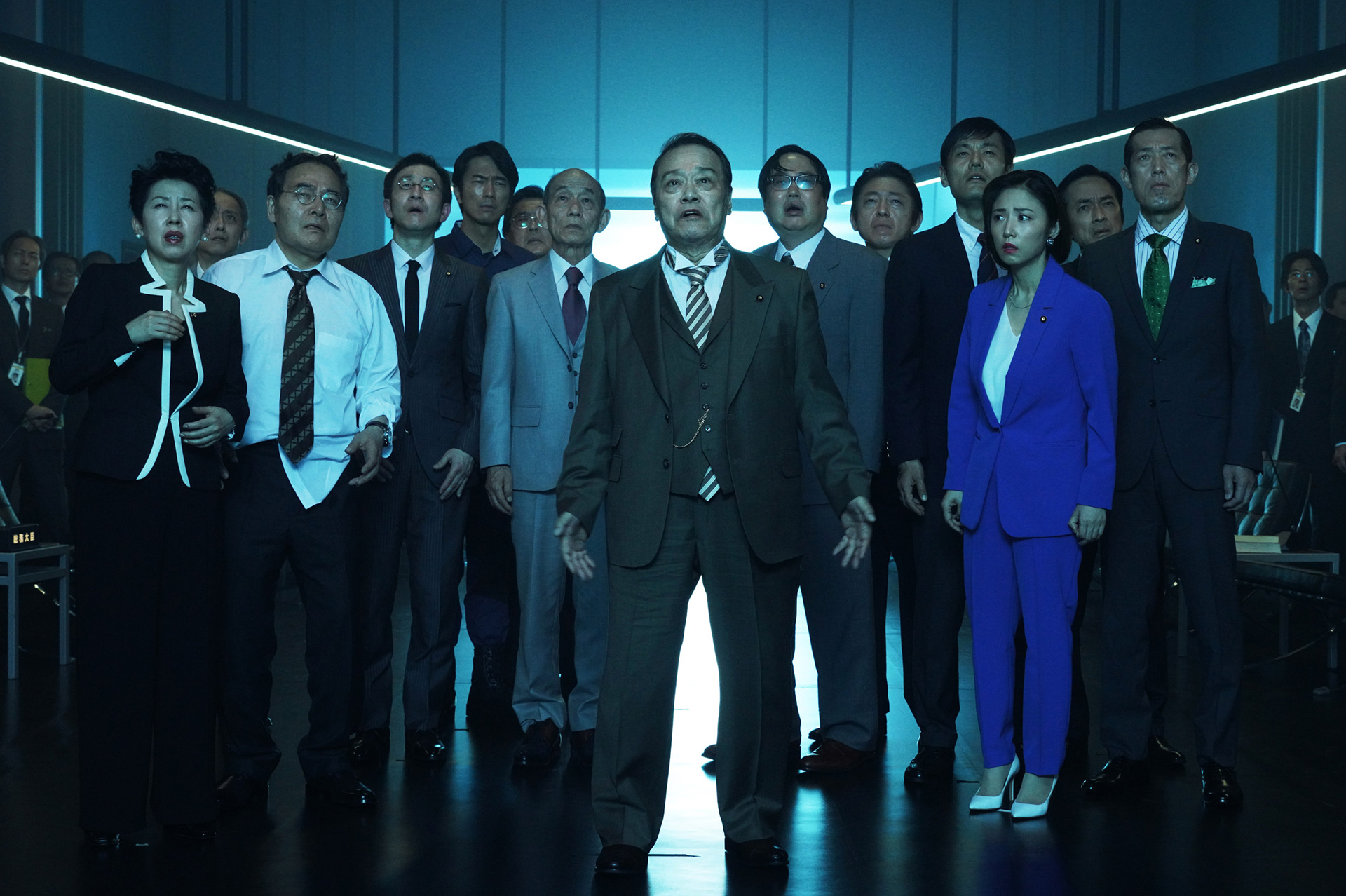The easiest way to describe the tone of Satoshi Miki’s realization of an objectively ingenious concept (What happens to the rotting carcass of a defeated kaiju?), is to mention the question to which every journalist demands an answer after a blister filled with the gaseous byproduct of the monster’s decomposition bursts: Does it smell like poo or puke? If that sounds like your idea of a good time for two hours, Daikaijū no Atoshimatsu [What to do with the Dead Kaiju?] is for you. If it doesn’t, however, the film will feel more like a different scene occurring much later, one where a character electronically leaks a classified photo and text file. Rather than an instantaneous transfer, we must literally watch the progress bar slowly fill to completion.
That’s how most films in this vein feel to me, though: the whole lowest common denominator comedic send-up of a usually earnestly dramatic genre piece a la Scary Movie. My not being well-versed in kaiju canon doesn’t help me see beyond the superficial laughs either (if something deeper and more contextually relevant does exist). For me, the experience was solely that of an outsider genuinely intrigued by what Prime Minister Nishiotachime (Toshiyuki Nishida) might do while the entire world looks at Japan under a microscope to judge and second-guess his every move. Unfortunately, he too second-guesses himself. So much so that he simply refuses to decide at all, leaving that to his cabinet of opportunistic ministers figuring out how to best leverage the scenario for their career advancement.
Miki’s film thus proves a thematic companion piece to Don’t Look Up insofar as showing the imbecilic nature of those we’ve put in charge of our safety. And as Nishiotachime and his cronies (lead by Ryô Iwamatsu’s Defense Minister with a penchant of using absurd analogies nobody around him understands and Eri Fuse’s ambitious Environmental Minister making everything into a photo-op for increased celebrity appeal) figure out how to spin things their way, the real work is left to the younger generation. A hero meant to take the fall if things fail (Ryôsuke Yamada’s Japan Special Forces Lieutenant Arata), a government official’s smarter underling (Tao Tsuchiya’s Yukino, Fuse’s secretary), and a power-mad up-and-comer (Gaku Hamada’s Masahiko, the Prime Minister’s right-hand confidant). Their triangle also provides the soapy histrionics.
All three used to work together at the JSF before an incident caused Arata to disappear for two years. Yukino and Masahiko got married, rose the ranks, and got a front row seat to the kaiju attack that no one (not the JSF or Iwamatsu’s military) could stop. If not for a random beam of light with no known origin, Japan might be completely destroyed right now. It killed the beast, leaving its body for everyone to wonder about viruses and radiation and … the mushrooms growing on its back like a mane. The seeming randomness of it all only increases the Prime Minister’s anxiety because he’s unsure whether to question their divine luck. Why risk negating the deus ex machina that saved them by looking for answers?
And the wheels of progress turn one revolution forward and two revolutions backwards every time someone has a new idea. There are a ton of ideas too from freezing it despite the seasonal heat (courtesy of Rinko Kikuchi’s Colonel) to expelling the gas like an indoor BBQ (courtesy of Yutaka Matsushige’s restauranteur Yamikumo). The idiots jockey for position, laughing all the way to their own petard hoisting, while Masahiko bides time to steal any credit. Those on the ground like Arata and Yukino genuinely want to find a solution, even bringing her brother’s demolitions expert Blues (Joe Odagiri) into the fold for his expertise. Affairs, stupidity, backroom deals, and more threaten to derail any potential progress until even talk of a supernatural “Chosen One” becomes reasonable.
Don’t get me wrong. There are some funny bits throughout. The cattiness between the ministers is always worth a laugh and the foreign powers going on live television to denounce the kaiju when it seems dangerous and demand a piece of it when it seems safe is exactly how this ordeal would play out. The jokes simply go on too long too often—like a decent skit stretched beyond its elasticity. In some instances, it also feels like Miki is trying to be dramatic despite having just provided us a poop joke minutes prior. I’d like to give him the benefit of the doubt and chalk up my inability to get on-board to my inexperience with the cinematic subject matter, but the bizarre stylistic choices never quite meshed.
It either goes too far or not far enough. And it relies so heavily on the deus ex machina of it all (letting the film’s characters acknowledge its existence) that watching them repeatedly attempt to use human ingenuity becomes a futile endeavor that only wastes time in the lead-up to whatever unexplained phenomenon will inevitably swoop in last second. As a result, we never really care about anyone on-screen. Arata and Yukino become pawns to the plot in ways that strip them of the autonomy necessary to cheer for a rejuvenated spark of romance and Masahiko, Nishiotachime, and the rest are too boring to hate now that nations are already led by similar caricatures. It is a great concept, though, and I’d love to see a serious take.
What to Do with the Dead Kaiju? played the Fantasia International Film Festival.

